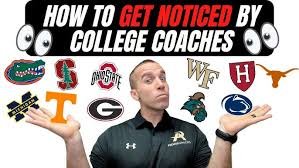If you’re a high school athlete hoping to land a college sports scholarship, the first step is simple: get noticed by college coaches. But in a world filled with talented athletes, standing out can be a challenge. The good news? You don’t have to be a national champion to get attention. With the right strategy, effort, and timing, you can increase your chances of catching a coach’s eye.
Here’s a guide on how to get noticed by college coaches and improve your shot at securing an athletic scholarship.
Start Early and Be Proactive
Many student-athletes make the mistake of waiting for coaches to find them. The truth is, most college coaches don’t have the time or budget to discover every potential recruit. It’s your job to take the first step. Start as early as your sophomore year of high school—some athletes even begin in freshman year. This gives coaches time to track your progress and growth.
Research the Right Schools
Not every athlete will end up at a Division I school—and that’s okay. The key is to find programs that match your skill level and goals. Research schools across all divisions (NCAA Division I, II, III, NAIA, and NJCAA) and create a list of colleges where you have a realistic chance of playing.
Consider:
- The level of competition
- The team’s needs (does your position have openings?)
- Academic requirements
- Location and campus culture
Create an Impressive Highlight Video
A highlight video is one of the most important tools in getting noticed. Coaches often review hundreds of videos, so yours needs to grab their attention quickly. Keep it short—no more than 3–5 minutes. Showcase your best moments early in the video, not just full game footage.
Make sure your video:
- Is clear and easy to follow
- Includes your name, position, jersey number
- Focuses on your strengths and key skills
- Highlights your hustle, teamwork, and athleticism
Don’t worry about fancy editing. Coaches want to see you play, not special effects.
Build a Sports Resume
A sports resume gives coaches a snapshot of who you are—both as an athlete and a student. Keep it clear and well-organized.
Your resume should include:
- Full name, age, height, and weight
- Sport and primary position(s)
- Academic information (GPA, SAT/ACT scores)
- Athletic achievements and stats
- Contact info (yours and your coach’s)
- Link to your highlight video
Send this resume with every email you write to a coach.
Send Personalized Emails to Coaches
A generic mass email won’t help you stand out. Instead, write short, personal emails to coaches at your target schools. Introduce yourself, mention why you’re interested in their program, and include a link to your highlight video and resume.
Your message should be polite, enthusiastic, and to the point. Keep it professional—treat it like a job application. Follow up if you don’t hear back within a week or two.
Attend Camps, Combines, and Showcases
These events give you a chance to compete in front of college coaches and recruiters. Look for college-hosted camps or national showcases where coaches are guaranteed to attend. Before you go, reach out to coaches and let them know you’ll be participating—they may come specifically to watch you.
At the event, be early, work hard, listen to instructions, and play like you’re being watched—because you probably are.
Stay Active on Recruiting Platforms
There are several online recruiting platforms (like NCSA, Hudl, and BeRecruited) that allow athletes to create profiles, upload videos, and connect with coaches. These sites are often used by college programs looking for potential recruits.
While it’s not a replacement for direct outreach, having an updated profile increases your visibility.
Maintain Strong Academics
Athletic ability is important, but so are your grades. Coaches don’t want to waste time on athletes who aren’t eligible to play due to poor academic performance. A solid GPA shows discipline, responsibility, and gives you access to additional scholarships.
Make sure you’re meeting the eligibility requirements for your division, and don’t wait until your final year to improve your grades.
Be Coachable and Positive
Word travels fast in the sports world. Coaches talk to high school and club coaches to get feedback on a player’s attitude and work ethic. Being coachable, respectful, and a team player can make or break your chances.
If a college coach hears that you’re hard to work with, they might move on to someone else—even if your skills are top-notch.
Keep Communication Open
If a coach reaches out to you, respond quickly and clearly. Answer their questions, show interest in their program, and be honest about your goals. Ask questions too—like what their training program looks like, how many scholarships they have available, and what they’re looking for in a recruit.
If you’re no longer interested in a program, politely let the coach know. It’s better to be upfront than to waste time on both sides.
Use Social Media Wisely
Coaches often check athletes’ social media pages. Use your platforms to highlight your training, games, and achievements—but always keep it clean and respectful. Avoid negative posts, inappropriate content, or anything that could hurt your image. Think of it as part of your recruiting brand.
Ask for Help When You Need It
Your high school coach, guidance counselor, or even a trusted mentor can support your scholarship journey. They can help you write emails, review your highlight video, or provide honest feedback. Don’t be afraid to ask.
Conclusion
Getting noticed by college coaches takes effort, consistency, and the right attitude. Start early, stay organized, and always put your best foot forward—on and off the field. Remember, you don’t need to be the fastest, tallest, or most famous player. You just need to show that you have talent, discipline, and the heart to succeed at the next level. Coaches are always looking for athletes who bring both skill and character to their teams—and that could be you.
4o
